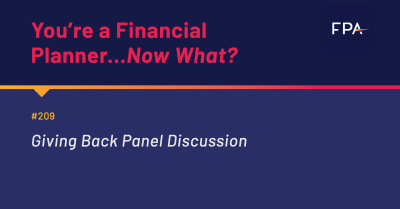
n our newest episode of YAFPNW, Hannah Moore, CFP®, hosts a “giving back” panel with Kurt Kaczor, Director of Pro Bono at FPA; Robinson Crawford, CFP®; Alex Wilson, CFP®, FPA of GA NexGen Director; and Kyle Eaton, CFP®. The group discusses how they got involved in pro bono work, what it has taught them, and how those looking to give back can get started.
Getting involved in pro bono work
The panel kicks off with introductions, each member explaining who they work with and how they first got involved in pro bono work. Robinson is a planner in Phoenix, Arizona who works with the joint partnership between the Foundation for Financial Planning and a nonprofit called Family Reach. Together, their program matches financial planners with families affected by a cancer diagnosis. Robinson had heard of pro bono work early in his career, but the first time it “really clicked” for him was during a speech by the founder of the Foundation for Financial Planning.
When Alex noticed that the FPA board in Atlanta was looking for volunteers at the end of last year, she joined as the Next Gen Director. From there, she began working with a new nonprofit called the Atlanta Volunteer Lawyers Foundation, or the AVLF. Alex began volunteering once a quarter, which then turned into monthly work, and now weekly with COVID-19.
Kyle works with Grace Like Rain, an organization based in Denton, Texas (not far from Hannah!) that helps families affected by poverty and homelessness. Kyle serves as a board member and treasurer, and is helping develop a personal finance program for the families.
Learning from pro bono work
What has pro bono work taught our panel guests? For Robinson, it’s how to slow down and listen more. In our regular work as financial planners, we’re often used to doing things, or “showing your value,” as he put it.
“There's a tendency towards activity professionally, where it's better to do something than nothing, it's better to make a recommendation or have something smart to say, or think of a way to save on tax or do something clever,” said Robinson. “I've learned to be more patient with myself, more patient with my recommendations and take more than I give, listen much more.”
Alex agreed. Pro bono work is not always about the numbers, or offering a solution. Sometimes it’s about “creating clarity around a situation,” inspiring clients, having empathy, and simply connecting with them on a deeper level.
Similarly, Kyle mentioned that there’s not necessarily a right answer when you get to know your clients needs. There’s a larger gray area, and when you don’t have a good answer, “you have to choose between two bad answers.” That’s why listening and understanding your clients is so important.
How to get started with volunteering
If you’re new to the profession and interested in pro bono work, there are a lot of great resources available. Kurt talked about several opportunities through FPA, but the first step is connecting with your local FPA chapter, which usually has a local designated pro bono director. Through that local director, you can learn about pro bono activities or programs.
Outside of the FPA, there are similar organizations like United Way, the Taproot Foundation, XYPN, and much more. Look at joining online communities, like the FPA Connect Pro Bono 360 Community, or groups local to your area.
And if there isn’t a pro bono program that really resonates near you? Think about starting your own! “You can consider volunteering to be a local pro bono director, if there's no existing programs or help start a pro bono initiative,” said Kurt. “Many of the programs have started this way, with the leadership of just one or two passionate members...where you identified a local nonprofit or something that was very important to you personally.”
Our panel shares a lot of wisdom and tips on pro bono work, so be sure to tune in and listen to the whole episode
What You’ll Learn:
- Robinson’s pro bono work
- Alex’s entry into nonprofit work
- Kyle’s involvement in the pro bono space
- What the group has learned through pro bono work
- How volunteering has impacted the group’s lives
- How everyone began volunteering
- Advice for financial planners who want to give back
- Pooling local resources for clients
- Resources from FPA and other organizations
Show Notes:
In this episode of YAFPNW, Hannah Moore, CFP®, hosts a “giving back” panel with Kurt Kaczor, Director of Pro Bono at FPA; Robinson Crawford, CFP®; Alex Wilson, CFP®, FPA of GA NexGen Director; and Kyle Eaton, CFP®. They discuss:
- The Foundation for Financial Planning and Family Reach partnership
- The Atlanta Volunteer Lawyers Foundation (AVLF)
- Grace Like Rain
- FPA Pro Bono Program
Want to keep up with our giving back panel hosts on social media?